
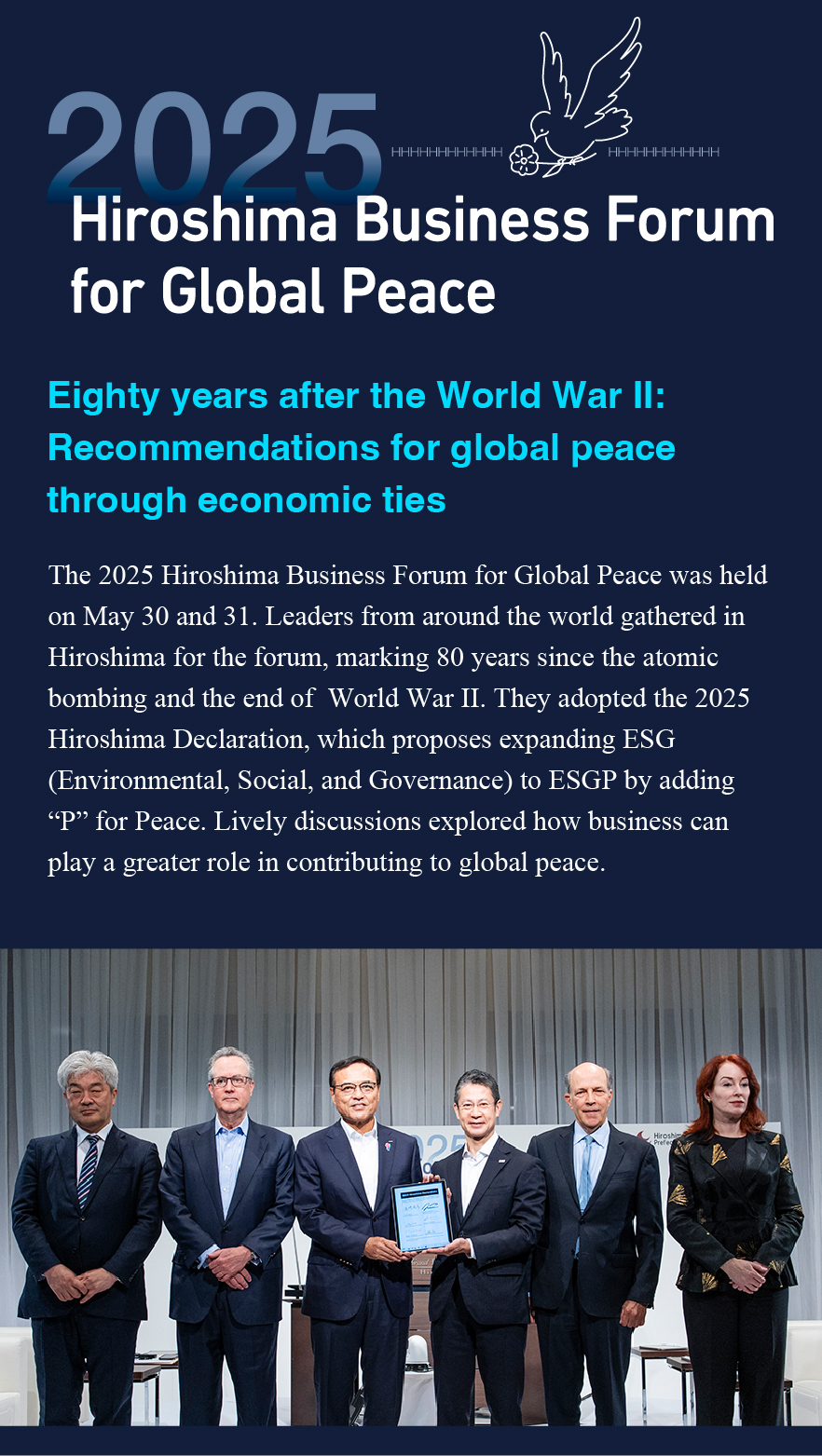


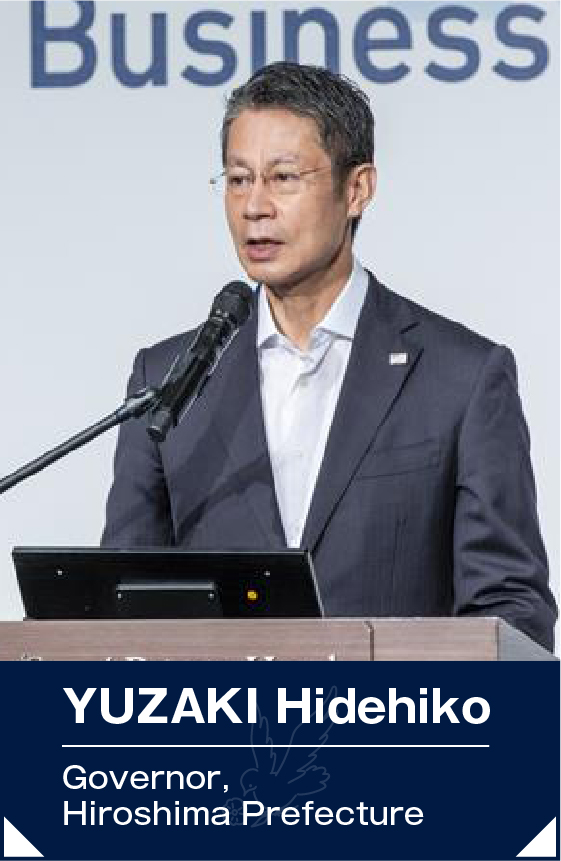
Yuzaki: Given the expansion of geopolitical risks and the proliferation of generative AI (artificial intelligence), a foundation of peace that transcends national borders and sectors is essential for solving global-scale challenges. Business efforts to address social issues contribute to the creation and maintenance of peace. The positive cycle between peace and business is indispensable for realizing a sustainable society.
To incorporate peace into business activities, we propose ESGP: a concept that augments the ESG corporate management indicators that aim for a sustainable society with the addition of “P” for peace. Peace requires stability and prosperity, which are in turn supported by securing basic living needs and human dignity.
Under the banner of ESGP, the 2025 Hiroshima Declaration serves as actionable guidelines for multi-stakeholders centered around businesses including business sectors and business organizations, investors (shareholders), national and local governments, and actors such as academia, think tanks and NGOs, as well as consumers.
I would like to join with multi-stakeholders centered around businesses to discuss what initiatives can be undertaken toward realizing a peaceful and sustainable society together.
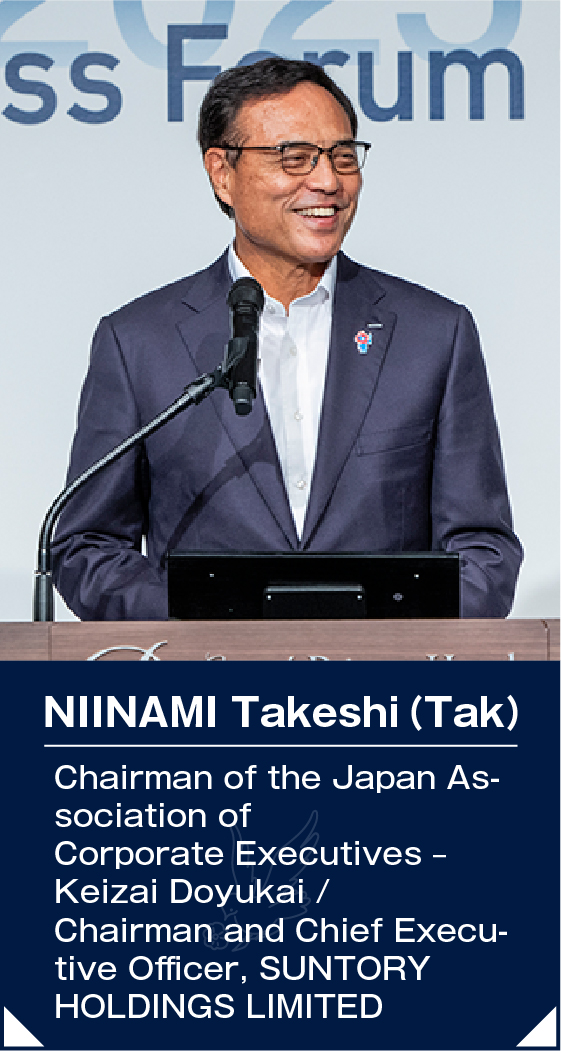
Niinami: Global uncertainty is increasing due to the expansion of conflicts and the nationalistic prioritizing of home country interests. Establishing peace, which is the basis for economic and social activities, is of paramount importance. ESGP is a timely proposal, because global stability cannot be achieved through military force alone. Countries need to connect economically and build relationships of trust.
When considering peace, we cannot avoid the topic of AI. While AI enhances human productivity, it can also threaten security if misused. We need an international framework similar to the one regarding peaceful use of nuclear energy. It will also be essential to upgrade free trade, which can also be a factor in widening inequality. The 2025 Hiroshima Declaration serves as a starting point for discussion and action on these issues. I look forward to active debate on a wide range of topics including AI and sustainability.
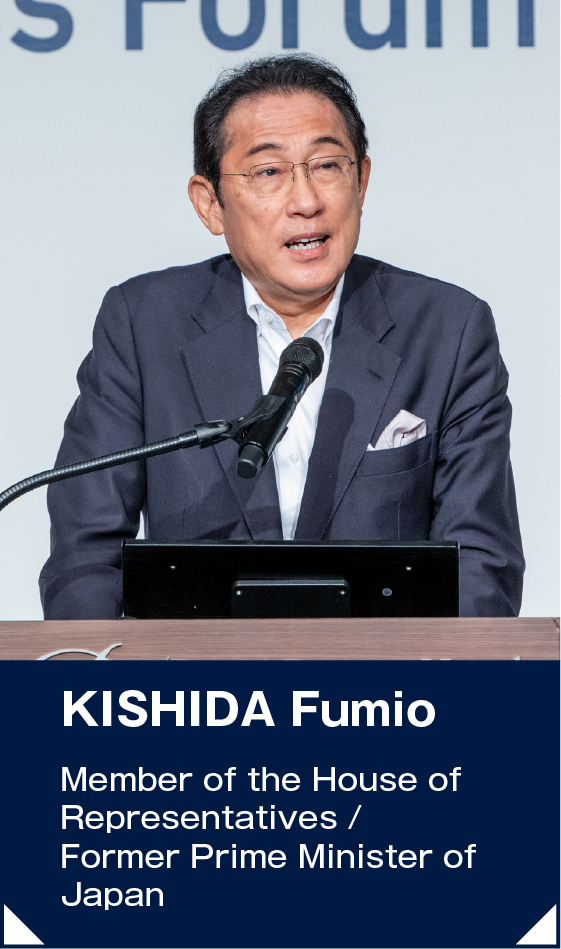
At the Group of Seven (G7) Hiroshima Summit, leaders gathered in Hiroshima-a city reborn as a symbol of peace from the devastation of atomic warfare-to discuss the wisdom needed to maintain a free and open international order and to protect peace and prosperity. It was Hiroshima’s industries that supported people’s basic needs for clothing, food and shelter that drove the city’s reconstruction.
Peace serves as the foundation for business, while economic growth through business contributes to the creation and maintenance of peace. Peace and business are thus inextricably linked. The global economy, which is premised on globalization and a stable international order, now stands at a crossroads. I sincerely hope that the principles of the 2025 Hiroshima Declaration, which codifies the virtuous cycle between peace and business, will be shared by political and economic leaders all around the world.
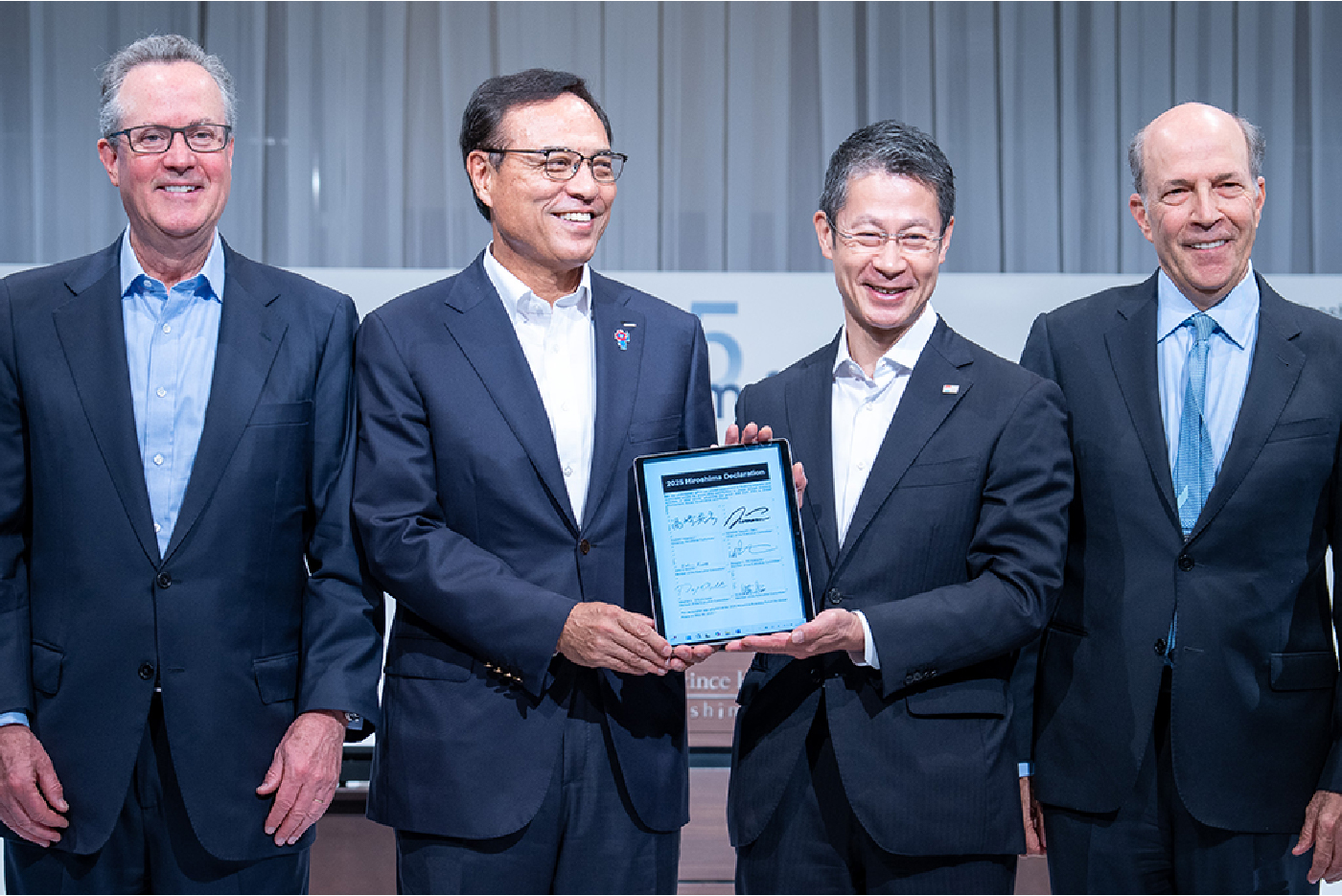
*Members of the Executive Committee signed the Hiroshima Declaration

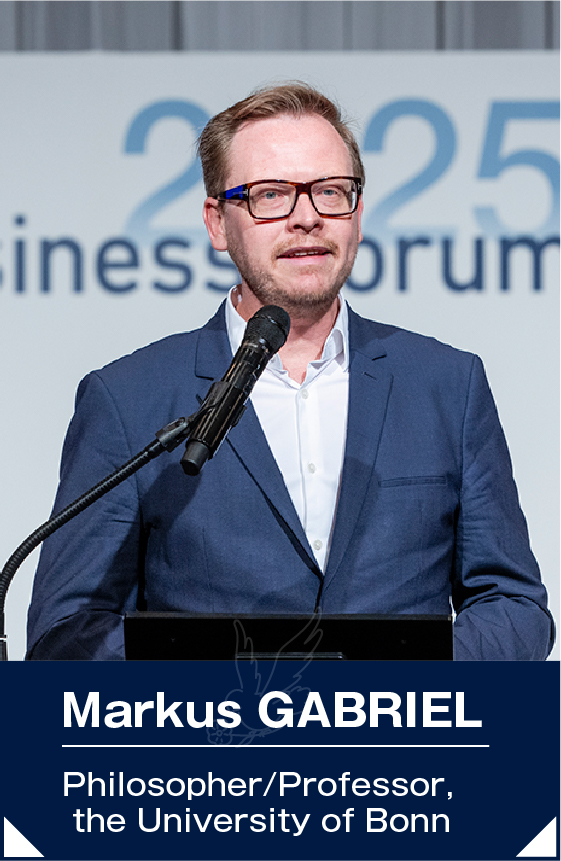
Climate change, widening economic inequality, security crises-as the world faces a situation where different types of crises become compounded in a “nested structure,” I have proposed ethical capitalism as a means to achieve a sustainable society. Ethical capitalism is the idea that sustainable growth will be generated through ethical economic activity that reintegrates moral values with economic values.
What is ethics? Its essence lies in the “moral facts” that serve as the sole answers to ethical questions. For example, if a child is drowning right in front of you while you are about to drink a beer, you should rescue the child even if your beer gets warm. Such universally shared judgments of good and evil that humanity holds are moral facts.
Capitalism has many advantages. Based on freedom of contract, it liberated society from slavery and feudalism. Market functions promote mutually supportive relationships. Just as demand shifted from fossil fuels to alternative energy, market mechanisms and technological evolution create innovation.
On the other hand, capitalism is criticized for causing negative effects on society such as exploitation and exacerbation of inequality. However, these are byproducts of capitalism, not its essence. It is impossible to create an economic system that can replace capitalism.
This is precisely why we must practice ethical capitalism. Humanity faces many challenges that need to be resolved in areas including gender, security, and the integration of AI (artificial intelligence) and robotics with society. In many of these areas, we have not yet reached consensus on what the moral facts are. Just as the laws of physics are discovered through experimentation, capitalism serves as the “laboratory” for forming social consensus on ethics.
We live in an era where conflicts between nations and ethnic groups are intensifying and causing division. In response to growing geopolitical risks, the purpose of ethics and philosophy is to promote pacifism and bring wars to an end. This task of ending war is itself a moral fact that must be realized.
The concept of ESGP adopted in the 2025 Hiroshima Declaration will likely serve as an important indicator for measuring the degree to which ethical capitalism is realized.
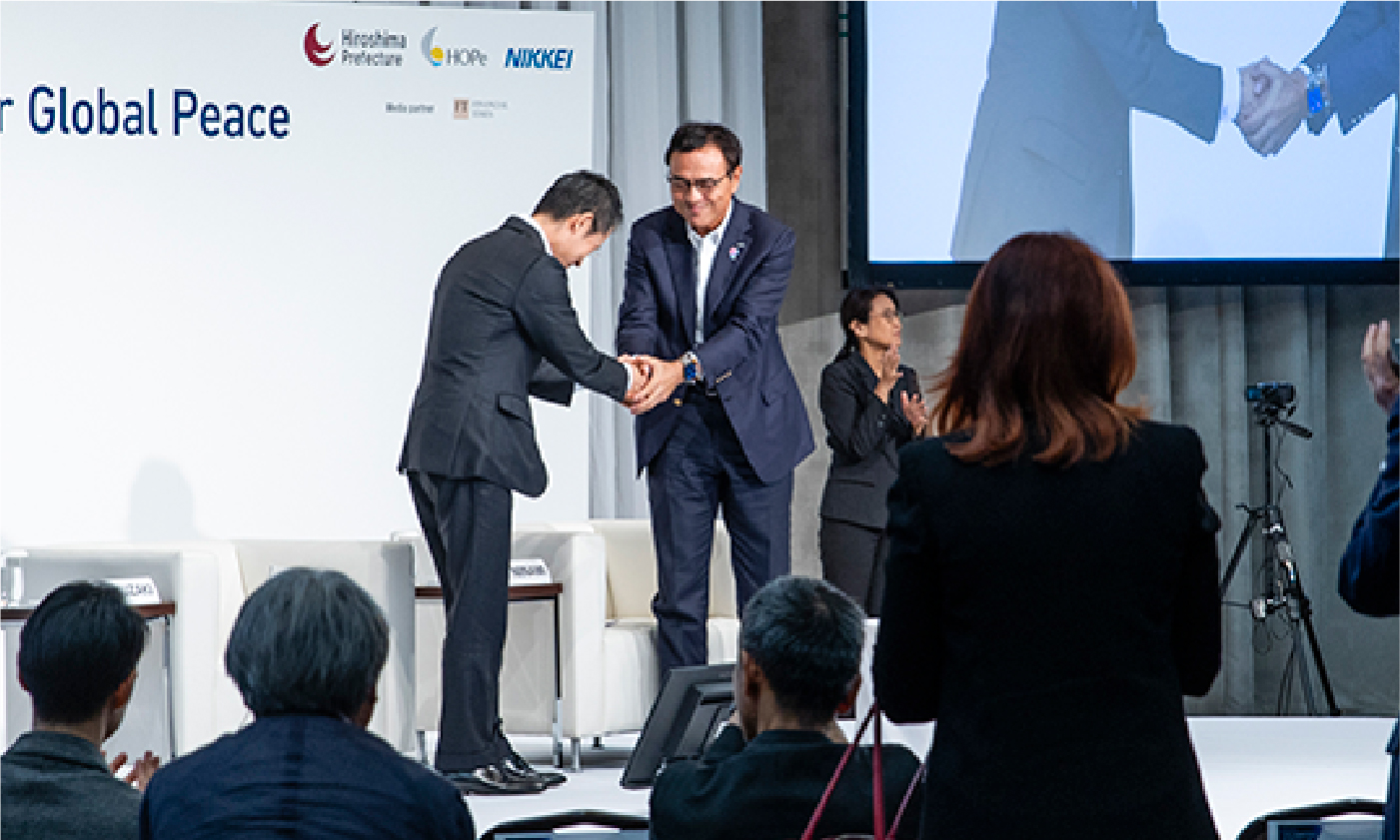
Niinami: In business, trade can foster economic interdependence and lay the foundations for peace. At the same time, it is the role of the national government to build diplomatic frameworks. Achieving and sustaining peace requires close coordination between the public and private sectors.
Yuzaki: The partnerships Japan has built with other countries are a valuable asset. I hope we can provide regular opportunities for global leaders to gather and discuss peace and business, as well as engaging actively in international forums as we strive to share the principles of ESGP with the world.
